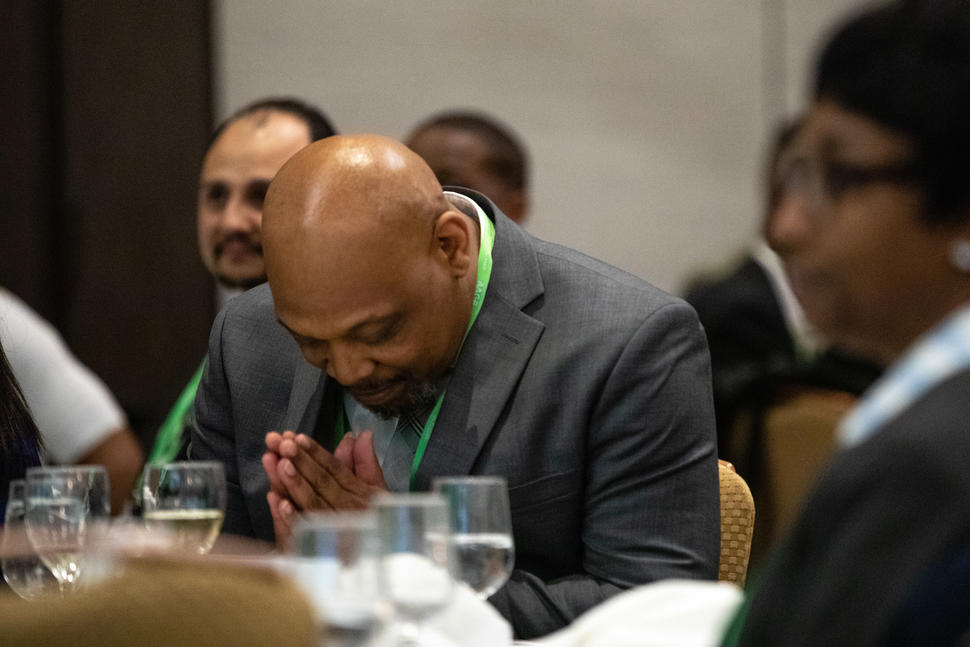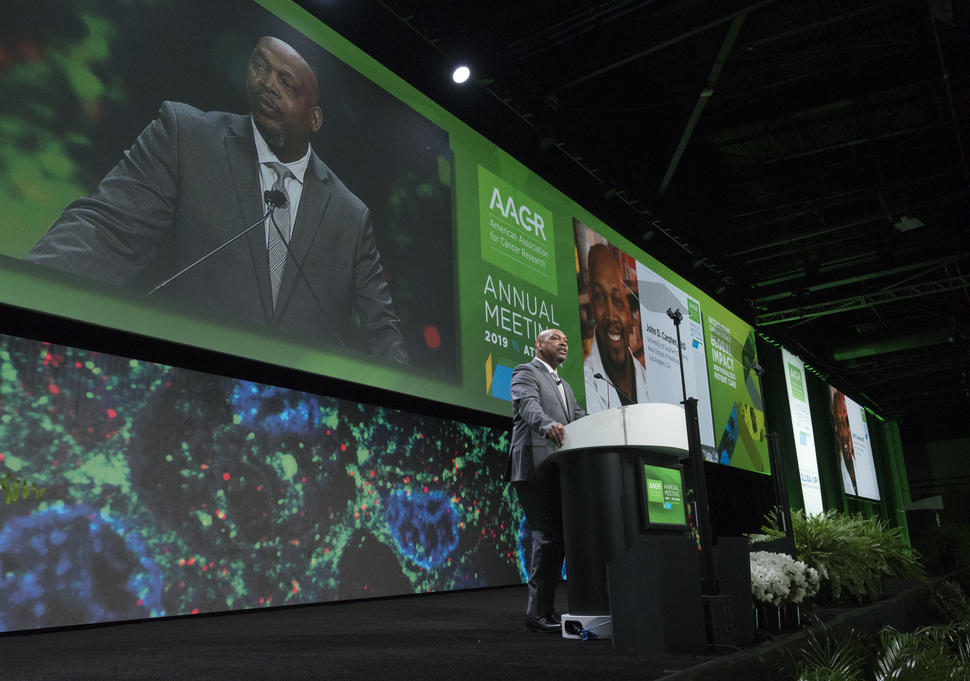On His Shoulders: Dr. John Carpten Made History by Becoming the First African American to Serve as AACR Annual Meeting Program Chair
, by Brian C. Davis
John D. Carpten, PhD is Professor and Chair of Translational Genomics, Director, Institute of Translational Genomics, Keck School of Medicine of the University of Southern California. In April 2019, Dr. Carpten became the first African American to serve as Program Chair of the American Association for Cancer Research Annual Meeting.
In 2018, Dr. John Carpten found out he would become a category of his own. A range of thoughts, feelings and emotions came to him when he took the phone call and heard the news.
Responsibility. He knew what this position would entail.
Honored. Over 100 of these American Association for Cancer Research (AACR) Annual Meetings had taken place, so, he reasoned during an interview, only 100 or so scientists had likely ever earned this opportunity.
Thirdly, pride. He felt a tremendous sense of pride, to have the opportunity and seemingly to be able to pay it forward on behalf of those who came before him. He, John D. Carpten, PhD, an internationally renowned expert in genome science, would become the first African American to serve as Program Chair of the AACR Annual Meeting in the 112th year of the organization’s existence and at its 110th Annual Meeting.
Setting the Stage
Atlanta
Being an African American from the south and understanding the historic context of Atlanta and race relations, “You could feel” how the meeting taking place in Atlanta was “another layer” to this historical moment, says Lee D. Gibbs, PhD, postdoctoral research fellow in Dr. Carpten’s lab and a mentee of his.
As the birthplace of both Dr. Martin Luther King Jr. and the civil rights movement, the city of Atlanta was a befitting venue for this historic moment. The significance of the venue seems even more apt not only as the nation celebrates Black History Month, but also when considering another major event which took place at the meeting—cancer disparities coming to the main stage.
As thousands of AACR attendees flew into Hartsfield-Jackson Atlanta International Airport, many likely walked past a tribute to Dr. King, which includes this memorable quote:
In the end, we will remember not the words of our enemies, but the silence of our friends.
AACR and its Chief Executive Officer, Margaret Foti, PhD, MD (hc), have not been silent, inactive or idle in their commitment both to cancer disparities and diversity in the cancer research field. In 2013, African Americans represented only 4.3% of doctorate degrees awardees in biomedical sciences, despite representing 13.9% of the U.S. population during this time period. AACR’s commitment had perhaps never been more clearly on display than the moment Dr. Carpten took the stage to open the meeting. Over the course of the six-day program, it would also become clear how much time and effort Dr. Carpten and others had invested to ensure that the program ran smoothly for its 21,500 attendees.
“Dr. Carpten was a brilliant, inspiring and highly dedicated Program Chair. Because of his extraordinary knowledge of the field, he developed a spectacular scientific program that captured the exciting research being conducted across the breadth and depth of the cancer field with novel presentations from diverse members of the AACR,” Dr. Foti says.
Dr. Carpten—The Protagonist of the Moment
Over the course of many conversations, cancer researchers and colleagues speak freely about Dr. Carpten the person. They speak of someone perfectly suited to be “the protagonist of the moment,” as described by Mariana C. Stern, PhD, who is Professor of Preventive Medicine & Urology, University of Southern California (USC) Keck School of Medicine, and Associate Director of Cancer Prevention & Control, USC Norris Comprehensive Cancer Center.
When Dr. Carpten walks into the proverbial room, he is humble, down to earth, approachable and easy to talk to, according to interviews. In the workplace, he is positive, optimistic and encouraging. Colleagues also describe someone fully equipped and prepared to be Program Chair: a natural leader; someone who pours his heart and soul into the work; someone who is about the science first and foremost; and someone who gets things done, through his own execution and by engaging the people with whom he’s working.
Dr. Carpten has a soft but convincing touch, says John M. Carethers, MD, MACP. He “has a vision, convinces you to execute that vision…,” and “You just willingly do it,” says Dr. Carethers, who is C. Richard Boland Distinguished University Professor, John G. Searle Professor and Chair, Department of Internal Medicine, and Professor, Human Genetics at the University of Michigan.
“He knew the pressure was on him to do a great job, and it doesn’t take much for him to do a great job,” says Dr. Carpten’s wife, Mary Kay Carpten, later adding, “It comes naturally to him.”
A Ceiling Was Broken
Minorities in Cancer Research
During two events at the AACR Annual Meeting—the Minorities in Cancer Research (MICR) Town Hall and the Awards Reception Honoring Minority and Minority-Serving Institution Faculty & Minority Scholar in Cancer Research Awardees—time was taken to pause to deliberately mention and describe the significance of Dr. Carpten serving as the first African American Program Chair.
The significance was not lost on those in the audience, whose eyes welled up with tears and whose arms were suddenly strewn with goose bumps, before they eventually erupted in applause and cheers. In their minds, audience members were processing the layered meaning of this moment, not only what this meant for Dr. Carpten but:
“What it meant for all of us. That, in a way, a ceiling was broken,” says Dr. Stern, of her feelings at the Awards Reception. "He was the first and he was opening the door for everyone who's coming behind him.”
Throughout his career, Dr. Carpten says he has been driven to volunteer for AACR not only because it is "undoubtedly the preeminent scientific society in cancer research," but also because of its longstanding commitment to diversity in cancer research and cancer disparities research.
“I just felt it was important to sort of maximize that opportunity as a way to continue to increase minority participation in cancer research,” says Dr. Carpten, regarding workforce diversity and community engagement in biomedical research, crediting Dr. Foti. He later continued, “…If I worked hard, I would typically see the fruits of my labor through AACR. That’s exactly the way things turned out.”
“The AACR has been proactively working to address minority equity for more than two decades. Our Minorities in Cancer Research membership group, which was established in 2000, is leading the way in increasing the number, participation, visibility and recognition of minority researchers in the cancer field, and patients are the beneficiaries of their contributions to cancer research.” Dr. Foti says.
Cancer Disparities
During the meeting, National Cancer Institute (NCI) Center to Reduce Cancer Health Disparities (CRCHD) Director Sanya A. Springfield, PhD, reflected on Dr. Carpten serving in the role in the context of another momentous first that took place at the Annual Meeting—the first AACR Annual Meeting plenary session to focus on cancer disparities, a field which has not always been universally embraced by the broader cancer research community. Prior to the 2019 Annual Meeting, the topic had been featured in the President’s Select Symposium and other session types.
The plenary, titled "Clinical and Translational Research in Diverse Populations,” focused on diversity by cancer disease site and ancestry and featured speakers from three different continents. With Dr. Carpten serving as chair and other program committee members focused on cancer disparities, Lisa M. Newman, MD, MPH, FACS, FASCO, says it was “not a coincidence” that this was an opportunity to focus on global cancer issues and cancer disparities.
“We just have a new voice, and a stronger voice to bring to the table,” says Dr. Newman, who is Chief, Section of Breast Surgery, Weill Cornell Medicine Cancer Center, Chief, Breast Cancer Disease Management Team, and Chief of the Breast Surgical Oncology Programs, New York Presbyterian-Weill Cornell Medicine Network.
The plenary also provided a platform to highlight the work of an upcoming cancer disparities investigator—Melissa Davis, PhD. During the first couple of hours after Dr. Davis had been invited been to present, she was convinced there was a mistake.
“I was waiting for a retraction email,” says Dr. Davis, recalling her disbelief.
For years she had watched AACR Annual Meeting plenary sessions and wondered what it must be like to present in front of their massive audiences. She never considered that she might be one of those speakers one day.
“It was life changing. It was career changing,” says Dr. Davis, who is Assistant (Interim) Professor of Cell and Developmental Biology, and Scientific Director, International Center for the Study of Breast Cancer Subtypes, Weill Cornell Medicine, Department of Surgery.
The Next Generation
It is clear that as a role model, Dr. Carpten has cleared a path for the next generation of cancer researchers, especially cancer disparities researchers. His commitment to providing guidance and mentorship to these investigators has never waned.
Dr. Davis met Dr. Carpten in her first year in graduate school at The Ohio State University (OSU), where Dr. Carpten was like a “big brother” to all of the minorities in the molecular sciences. He organized support groups, facilitated networking and offered great advice, including how to get acclimated at a place like OSU, which was so different from the small towns in which many of the minority students had lived while attending small Historically Black Colleges and Universities.
“[Dr. Carpten] made an impression on me that sort of gave me the impetus to not give up, because when you come to a place [like OSU] that is completely different from anything you’ve ever experienced, it can be so daunting that you wonder, ‘Should I continue?'" Dr. Davis says.
“Without [Dr. Carpten] being there and inspiring us, I think I wouldn’t have even finished,” she says.
To the next generation of minority cancer researchers, Dr. Carpten explains that if he has a message to share, it would be three key points.
“First of all, be excellent,” he says, without hesitation. “Don’t get in the way of your own success, and reach out to those folks in the field who have your back and those people who have your best interest at heart. Follow those people and work with those people.”
These are pieces of advice for young investigators who aspire to serve, who strive to advance this growing field, and who seek to be a model for current and future cancer researchers. In a city like Atlanta, which has been home to pioneers of the past, Dr. Carpten became the pioneer—the giant—who paved the way for many of the opportunities now available to young investigators, as well as those still to come.


